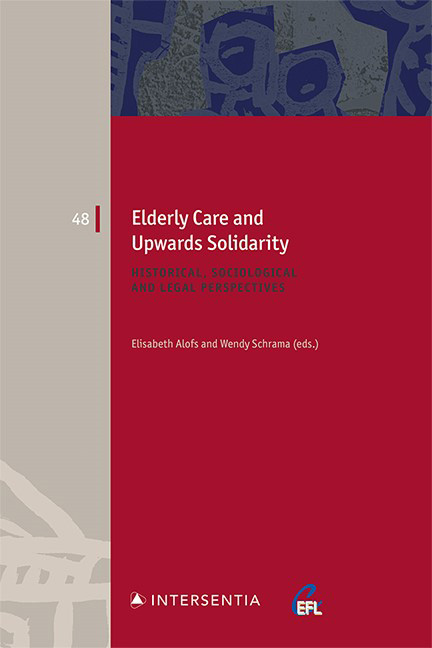Book contents
- Frontmatter
- Acknowledgements
- Contents
- List of Cases
- List of Contributors
- An Introduction to Ageing, Care and Upwards Solidarity
- PART I INTERDISCIPLINARY PERSPECTIVES ON AN AGEING SOCIETY AND CARING FOR THE ELDERLY
- PART II LEGAL PERSPECTIVES ON ELDERLY CARE
- Conclusion: A Roadmap for Future Research on Care for the Elderly
- European Family Law Series
Maintenance Law and Elderly Care in Western Societies
Published online by Cambridge University Press: 22 December 2020
- Frontmatter
- Acknowledgements
- Contents
- List of Cases
- List of Contributors
- An Introduction to Ageing, Care and Upwards Solidarity
- PART I INTERDISCIPLINARY PERSPECTIVES ON AN AGEING SOCIETY AND CARING FOR THE ELDERLY
- PART II LEGAL PERSPECTIVES ON ELDERLY CARE
- Conclusion: A Roadmap for Future Research on Care for the Elderly
- European Family Law Series
Summary
INTRODUCTION
Maintenance law deals with care by means of affording persons in need the financial resources to bear their needs, including the costs of care. Maintenance claims are, thus, mainly a financial provision. However, the actual care of persons in need, when provided by those who are obliged to pay maintenance, is also taken into account by maintenance law. That is important, for instance, when dealing with the maintenance obligations of custodial parents towards their minor children. It is also taken into account by some jurisdictions, where the law expressly stipulates that the maintenance debtor may choose the method in which he pays maintenance: in natura or by paying a sum of money. In this book concerning elderly care only maintenance of parents by children (or grandparents by grandchildren) has to be considered. The perspective in this contribution on maintenance law must concentrate therefore upon older people in need of care who lack the financial means to cope with their needs. Therefore, spousal maintenance claims after divorce or after widowhood can be dispensed with, which in fact are also sources of income to care for the elderly, especially old women.
Elderly care can be addressed from two different legal standpoints, which are often intertwined. Firstly, by reference to maintenance claims available in most of the Western legal systems. This perspective would lead one to examine the requirements and the scope of civil law claims directed to obtain maintenance from one‘s children, and the rights and duties derived therefrom. From another standpoint, one should turn an eye to the foundations of these legal claims and try to assess their rationality against the current societal, economic and political environment.
Both standpoints – namely, de lege lata and de lege ferenda – can be kept separated only in theory. Both come together in practice especially relating to the enforcement by third parties (hospitals, local authorities) of claims based on the maintenance right legally conferred to deprived old persons. When the public administration or the courts deal with claims to recover the costs of hospital treatment, hospice expenses or the residential home costs caused by the holder of maintenance rights, a debate arises about the redistribution of limited public resources for health and social services.
- Type
- Chapter
- Information
- Elderly Care and Upwards SolidarityHistorical, Sociological and Legal Perspectives, pp. 67 - 82Publisher: IntersentiaPrint publication year: 2020

